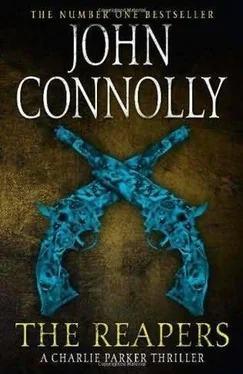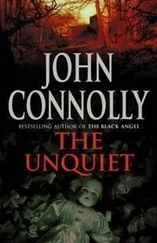Louis had once bought Angel a beautiful Brioni jacket as a gift, and the garment had languished in a closet for years. When Louis had eventually confronted Angel about it, Angel had explained that it was too expensive to wear, and he wasn’t the kind of guy who wore expensive clothes. Louis hadn’t understood the response then, and he wasn’t sure that he understood it a whole lot better now, but he had since learned to bite his tongue when Angel presented his latest purchases for approval, unless faced with provocation beyond the tolerance of mortal man to endure. For his part, Angel had started to learn that a bargain wasn’t a bargain if no one could look at it without shades or antinausea medication. An accommodation of sorts had therefore been reached.
Now, while Angel sat in his workroom and stared vacantly at the electronic components arrayed before him, Louis was in an anonymous office ten blocks away, a computer screen glowing before him, wondering if it might not be better to deal with Leehagen himself, to leave Angel behind. The thought lasted about as long as a bug in an oven. Angel would not stay. It was not in him to do so. Yet, unlike Angel, this was Louis’s purpose: to hunt, to provide the ultimate solution to any problem. He enjoyed it. Ever since the emergence of the Leehagen threat, he had felt more alive than he had at any other point in the last year. Old muscles were returning to life, old instincts coming to the fore. He, and the things and people that mattered to him, were in danger, but he felt himself capable of meeting and neutralizing the threat. Angel would stand alongside him, but he would not share Louis’s pleasure in what was to come, and Louis would try to hide his own as best he could. It was not a pleasure in killing, he told himself, but the pleasure that a craftsman takes in exercising his skills. Without that opportunity, well, he was just a man, and Louis did not care for being “just” anything.
He switched on the computer, and began tracking Arthur Leehagen.
Gabriel sat in Wooster’s observation room. The boy was tall, although a little too slim, but that would change. He was handsome now, and would be handsome yet. There was a stillness to him that boded well. Despite his hours of interrogation, he held his head high. His eyes were bright and watchful. He did not blink often.
After a couple of minutes had passed, the boy’s posture changed slightly. He tensed, and his head tilted, like an animal that has sensed the approach of another but has not yet decided if it represents a threat. He knew that he was being watched and that it was no longer Wooster who was observing him.
Gabriel leaned forward in his seat and touched the glass, running his fingers over the boy’s head, his cheekbones, his chin, like a breeder checking the quality of a thoroughbred horse. Yes, he thought, you have the potential to become what I need.
There is a Reaper in you.
Gabriel knew that the vast majority of men were not born killers. True, there were many who believed themselves to be capable of killing, and it was possible to condition men to become killers, but few were born with that innate ability to take the life of another. In fact, throughout history it had been known that men in combat demonstrated a marked reluctance to kill, and would not do so even to save their own lives, or the lives of their comrades. During World War II, it was estimated that as few as 15 percent of all American riflemen in combat actually fired their weapons at the enemy. Some would fire wide or high, if they fired at all. Others would take on ancillary tasks such as carrying messages, transporting ammunition, even rescuing under fire fellow soldiers who had been injured, sometimes at far greater risk to themselves than might have been the case had they stayed in position and used their weapons. In other words, this was not a matter of cowardice, but a consequence of an innate resistance among humans to the killing of their own species.
All of that would change, of course, with improvements in the conditioning of soldiers to kill. Yet conditioning was one thing, while finding a man for whom that conditioning was not required was quite another. At times of fear or anger, human beings stop thinking with their forebrain, which is, in effect, the first, intellectual filter against killing, and start thinking with their midbrain, their animal side, which acts as a second filter. While there were those who suggested that, at this stage, the “fight or flight” mechanism came into play, the range of responses was actually more complex than that. In fact, to fight or to flee was the final choice, once posturing or submission had been eliminated.
Overcoming that second filter was one of the aims of conditioning, but there were those in whom that midbrain filter was absent. They were sociopaths, and in a sense, the purpose of conditioning was to create a pseudosociopath, one who could be controlled, one who would obey orders to fight and kill. A sociopath obeyed no orders, and therefore could not be controlled. A properly trained and conditioned soldier was a weapon in himself. In that process, of course, something good was lost, perhaps even the best part of the human being involved: it was the understanding that we do not exist merely as independent entities, but are part of a collective whole and that each death lessens that whole and, by extension, ourselves. Military training required that understanding to be nullified, that realization to be cauterized. The problem was that, like the early surgical procedures of ancients, this process of cauterization was based upon an inadequate understanding of the workings of human beings.
Fears of death or injury were not the main causes of mental breakdowns in combat; in fact, they were found to be among the least important factors. Nor was exhaustion, although it could be a contributor. Rather, it was the burden of killing, and of killing up close and knowing that it was your bullet or your bayonet that had brought a life to an end. Sailors did not suffer psychiatric casualties to any similar degree. Neither did bomber pilots dropping their loads high above cities that might have been, from their distant vantage point, entirely empty of citizens. The difference was one of proximity, of, for want of a better term, intimacy. This was death heard and smelled and tasted and felt. This was to face the aggression and hostility of another directed entirely at oneself, and to be forced to acknowledge one’s own aggression and hatred in turn. It was to recognize that one had become, potentially, both victim and executioner. This was a denial of one’s own humanity, and the humanity of others.
The boy named Louis was unusual. Here was an individual who had responded to a hostile stimulus in a forebrained way, approaching the threat as a problem to be solved. It wasn’t simply that the second, midbrain filter had been overcome; instead, Gabriel wondered if the issue had ever even reached that stage. This was a cold-blooded, premeditated killing. It indicated significant potential. The difficulty, from Gabriel’s point of view, lay in the physical distance from the killing itself that the boy had maintained. Gabriel understood the relationship between physical proximity and the trauma of killing. It was harder to kill someone up close with a knife than it was to shoot him at long range with a sniper’s rifle. Similarly, the sense of elation that frequently came with a kill was increasingly short-lived the closer the killer was to the victim, because in that situation guilt was as close as the body. Gabriel had even known soldiers to comfort the man whose life they had taken as he lay dying, whispering apologies for what had been done.
In real terms, the apparent ease with which the boy had killed suggested a possible dissociation, a reluctance or inability to recognize the consequences of his actions; that, or an intellectual understanding that he had murdered someone combined with an emotional denial of the act, and with that any real responsibility for it. He would have to be tested further so that his true nature might be revealed. The boy did not appear to be showing signs of undue stress. He had, it seemed, handled himself calmly when faced with sometimes violent interrogation. He had not broken. He was not seeking an opportunity to confess, to expiate his sin. True, stress might reveal itself later, but for the moment he appeared relatively untroubled by what he had done. It was only a small percentage of men, that elusive 2 percent, who, under the right circumstances, could kill without remorse. Those circumstances did not necessarily involve personal risk, or even a risk to the lives of others. It was, at one level, a matter of conditioning and situation. At some point, the boy would have to be placed in the right environment in order to see how he might respond. If he did not react correctly, that would be the end of the matter. It might also, Gabriel knew, mean the boy’s death.
Читать дальше












